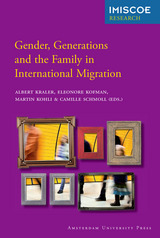5 start with G start with G

Family-related migration is moving to the center of political debates on migration, integration, and multiculturalism in Europe. Still, strands of academic research on family migrations and migrant families remain separate from—and sometimes ignorant of—each other. This volume seeks to bridge the disciplinary divide. Collectively, the authors address the need to better understand the diversity of family-related migration and its resulting family forms and practices, to question simplistic assumptions about migrant families in public discourse, to study family migration from a mix of disciplinary perspectives, and to acknowledge the state’s role in shaping family-related migration, practices, and lives.


This book explores the effects of global socio-economic forces on the domestic policies and administrative institutions of Japan and the United States, and it explains how these global factors have shifted power and authority downward from the national government to subnational governments.
This major comparative study comprises ten pairs of essays written by leading Japanese and American scholars on parallel public policy issues, institutional patterns, and intergovernmental relations in Japan and the United States, all set in the context of globalization and its impact on decentralization in each country. The twenty contributors and the editors provide new insights into the domestic consequences of global interdependence by examining emerging strategies for dealing with environmental concerns, urban problems, infrastructure investments, financial policies, and human services issues.
An important study of the changing global setting, Globalization and Decentralization emphasizes the innovative and adaptive roles played by Japanese and American state, provincial, regional, and local governments in responding to the dramatic economic and political power shifts created by the new world order.

Few would disagree that Western democracies are experiencing a crisis of representation. In the United States, gerrymandering and concentrated political geographies have placed the Congress and state legislatures in a stranglehold that is often at odds with public opinion. Campaign financing ensures that only the affluent have voice in legislation. Europeans, meanwhile, increasingly see the European Union as an anti-democratic body whose “diktats” have no basis in popular rule. The response, however, has not been an effective pursuit of better representation. In Good Government, Pierre Rosanvallon examines the long history of the alternative to which the public has gravitated: the empowered executive.
Rosanvallon argues that, faced with everyday ineptitude in governance, people become attracted to strong leaders and bold executive action. If these fail, they too often want even stronger personal leadership. Whereas nineteenth-century liberals and reformers longed for parliamentary sovereignty, nowadays few contest the “imperial presidency.” Rosanvallon traces this history from the Weimar Republic to Charles De Gaulle’s “exceptional” presidency to the Bush-Cheney concentration of executive power.
Europeans rebelling against the technocratic EU and Americans fed up with the “administrative state” have turned to charismatic figures, from Donald Trump to Viktor Orbán, who tout personal strength as their greatest asset. This is not just a right-wing phenomenon, though, as liberal contentment with Obama’s drone war demonstrates. Rosanvallon makes clear that contemporary “presidentialism” may reflect the particular concerns of the moment, but its many precursors demonstrate that democracy has always struggled with tension between popular government and concentrated authority.

Democratic government is about making choices. Sometimes those choices involve the distribution of benefits. At other times they involve the imposition of some type of loss—a program cut, increased taxes, or new regulatory standards. Citizens will resist such impositions if they can, or will try to punish governments at election time. The dynamics of loss imposition are therefore a universal—if unpleasant—element of democratic governance. The Government Taketh Away examines the repercussions of unpopular government decisions in Canada and the United States, the two great democratic nations of North America.
Pal, Weaver, and their contributors compare the capacities of the U.S. presidential system and the Canadian Westminster system to impose different types of losses: symbolic losses (gun control and abortion), geographically concentrated losses (military base closings and nuclear waste disposal), geographically dispersed losses (cuts to pensions and to health care), and losses imposed on business (telecommunications deregulation and tobacco control). Theory holds that Westminster-style systems should, all things being equal, have a comparative advantage in loss imposition because they concentrate power and authority, though this can make it easier to pin blame on politicians too. The empirical findings of the cases in this book paint a more complex picture. Westminster systems do appear to have some robust abilities to impose losses, and US institutions provide more opportunities for loss-avoiders to resist government policy in some sectors. But in most sectors, outcomes in the two countries are strikingly similar.
The Government Taketh Away is essential for the scholar and students of public policy or comparative policy. It is also an important book for the average citizen who wants to know more about the complexities of living in a democratic society where the government can give-but how it can also, sometimes painfully, "taketh away."
READERS
Browse our collection.
PUBLISHERS
See BiblioVault's publisher services.
STUDENT SERVICES
Files for college accessibility offices.
UChicago Accessibility Resources
home | accessibility | search | about | contact us
BiblioVault ® 2001 - 2024
The University of Chicago Press









